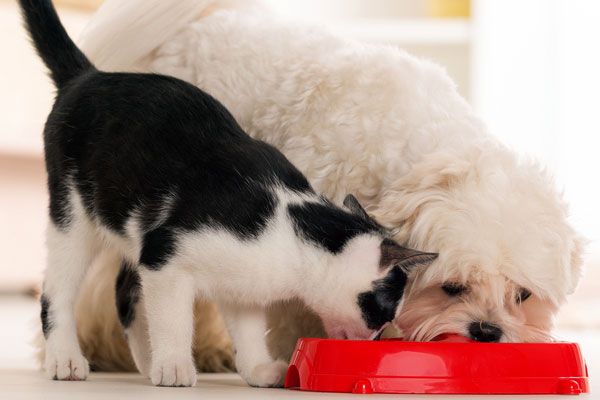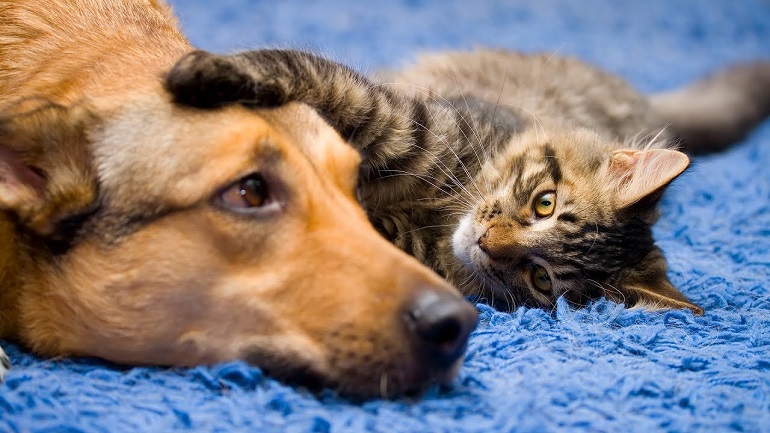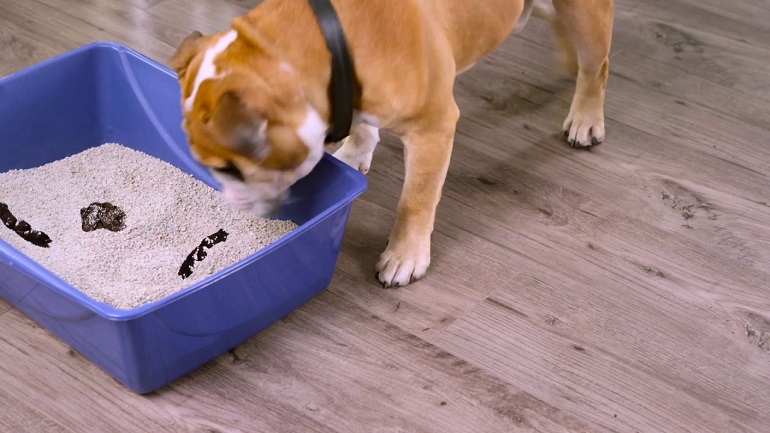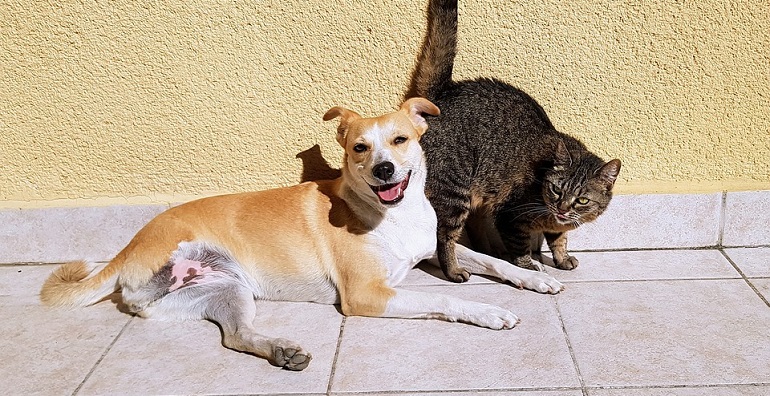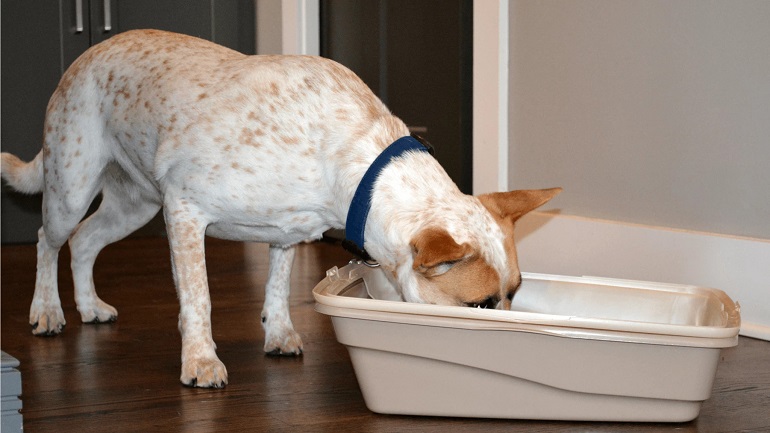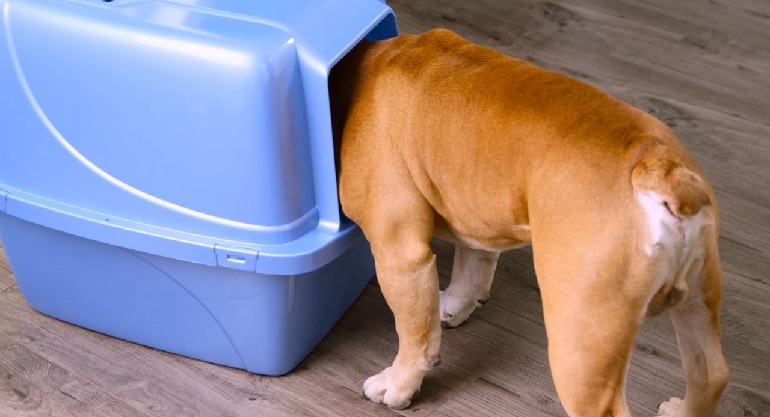The sight of your dog happily munching on cat poop is enough to make any owner queasy. But this disgusting habit, known as coprophagia, is surprisingly common. Why do dogs find feline feces so appealing? This seemingly bizarre behavior often stems from dietary deficiencies, boredom, or even just plain curiosity. Luckily, it’s usually not harmful and there are simple, effective ways to curb this unpleasant habit. From dietary changes to environmental management, we’ll explore the reasons behind this behavior and offer practical solutions to keep your dog’s snacking habits a little less…icky.
If you hadn’t witnessed it with your own two eyes, you wouldn’t have been able to believe it, but it happened. There’s your dog eating cat poop straight from the litter box.
You’re going to feel a lot of things seeing this happen, such as disgusted, appalled, and confused!
Why does your dog eat cat poop, and what can you do to stop this behavior for good? Those are questions I plan to address ahead. Whether your dog only pulls this stunt on occasion or has now begun incorporating cat poop into its regular diet, keep reading! This information is can’t-miss.
The Science Behind Why Dogs Eat Cat Poop
Believe it or not, there’s a perfectly logical scientific basis for why your dog has begun feasting on cat poop. Dogs, if you let them, will eat all sorts of inedible items they shouldn’t, including rocks, carpeting, trash, and poop of all kinds. That includes dog and cat poop alike. It’s a testament to their scavenging nature.
The availability of cat poop certainly also doesn’t help. The poop is right there out in the open (especially if your cat’s litter box is unenclosed), tempting your dog. That’s like leaving a slice of chocolate cake on the counter and expecting you not to eat it. You’ll cave eventually.
Reasons Why Dogs Eat Cat Poop
Now we will look, in detail, at all the reasons for dogs eating cat poop and understand the reasons behind this weird behavior!
Nutritional Deficiencies
There are yet more reasons that dogs eat cat poop, and it’s only fair to address them so you can better understand your canine’s behavior. For example, one such reason your dog might be so eager to snack on litter poo is that they have a nutritional deficiency.
If your dog is lacking vitamin B, protein, fiber, or fat in their diet, then they’ll try to get these nutrients, minerals, and vitamins however they can. Yes, that does include cat poop, which can contain nutrients as well as protein.
Boredom
Many dog owners think that physically stimulating their canines is enough for them, but that’s not quite true. A dog needs mental stimulation as well.
Without something to entertain them, your dog can quickly become bored, and once they are, especially when left to their own devices, bad things usually happen.
At the very, very least, your dog is going to begin eating cat poop straight from the cat litter box, but it can get so much worse than that.
For example, your pup can begin destroying furniture or whatever is in the vicinity. By that point, the cat poop-eating habit is truly the least of your problems.
Taste
This is going to sound incomprehensible to you, but dogs actually don’t mind the smell of cat poop much, and the taste certainly doesn’t bother them at all. To them, the cat feces has a smell reminiscent of your cat food, dry or wet food, both of which dogs usually find palatable.
That smell can drive your pup to give some cat poop a taste. Once they realize that it passes their standards for what an edible item is, they’ll munch on more as it becomes available. Before you know it, you don’t even get a chance to clean up the poop from your cat litter box because your dog did it for you.
Is It Normal for Dogs To Eat Cat Poop?
It may sound surprising, but yes, it’s completely normal to find your dog eating cat poop, as dogs love strong smells. The smell of poop or cat food can literally trigger dogs to get a taste of it.
Dogs are inherently explorers, and poop-eating is a by-product of their instinctive nature. They are scavengers as stated earlier, and they aren’t picky when it comes to their eating habits.
Sometimes, they are also attracted to the protein content in it, which might be an alarming sign that your dog’s diet is lacking in some essential nutrients. It might also highlight a vitamin deficiency in your dogs.
Is Cat Poop Bad for Dogs?
You worry that your dogs eat cat poop. It’s not only that this act is absolutely disgusting (which it definitely is!), but you worry about the effects on your dog’s health, especially long-term. Should you be concerned?
Indeed, your worry is not unfounded in the slightest. While you may notice dogs consuming cat poop and going along well. But as with all fecal matter, if your dogs eat feces, it may bring a lot of health issues along.
Cat poop contains many harmful bacteria and parasites, which means bad news if your canine buddy gets in a habit of eating poop on a regular basis. Some of these germs can even be transferred to humans unknowingly.
So it’s a good idea to get to the root cause and try to stop your lovely pal from eating poop!
How To Prevent Your Dog From Eating Cat Poop
You want to nip this unwanted behavior in the bud, but how do you stop your canine companion from eating the cat’s litter box? Here are some suggestions to implement.
Teach Your Dog the ‘Leave It’ Command
‘Leave it’ is the best command when it comes to controlling what your dog can eat and what isn’t edible. Most dogs relish eating anything they get their paws on, so it’s a great idea to train your dog to leave something alone whenever the situation arises.
Keep Them Mentally and Physically Stimulated
A contented dog will feel less need to scavenge. Introduce some new toys into your dog’s routine, take them on a different walking path, and teach them some new tricks to keep them mentally engaged.
Don’t forget to physically tire them out too! Your dog should be exercising for 30 to 45 minutes a day. If they’re not, then begin ramping up the level of physical activity. Your dog will be too tired to look for a snack in the litter box.
Invest in Stool Deterrents
You can also stop unwanted behavior in your dogs by using specially formulated stool deterrents. These are, basically, taste-aversion products that taste and smell disgusting to your dogs and they feel compelled to leave them alone.
All you have to do is add this product to cat poop to make it less appealing to your canine friends.
Get Dog Proof Litter Boxes
If your dog keeps visiting and eating from the cat box, then getting dog-proof litter boxes or covered litter boxes is a good alternative. Your dog won’t be able to weasel its way into the box. They’ll find the poop too challenging to reach and hopefully give up.
To Keep Them Away, Use Fences
Fences and baby gates are great methods for stopping a mightily curious dog from going where it shouldn’t be. Make sure you set up the gates on both sides of the room with the litter box for this method to be effective.
Clear the Litter Box ASAP
It might sound physically taxing but cleaning your cat box as soon as your kitty defecates is the most obvious way to stop your dog from unhealthy snacking. Alternatively, you can also invest in automatic litter stations to get the job done!
- In the Litter Box, Sprinkle Some Black Pepper or Hot Sauce
Misting the box with some hot sauce or springing black pepper is a sure-shot way to discourage your dog’s unruly munching. It is an easy and convenient way to stop your friend from approaching and tasting the cat’s feces.
The Right Nutrition for Your Dogs
Most importantly, you need to make sure that you are providing wholesome dog food to your buddy that caters to all their intake requirements and supplements. A well-balanced diet will prevent any dietary deficiency in your dogs and might also help to mitigate this gruesome habit.
Move the Litter Box Where Your Dog Can’t Reach It
You can also curtail your dog’s bad behavior by moving the litter box to a spot that’s inaccessible to your dog. Just make sure your cat can still reach the box, or they’ll begin having accidents around the house that will only feed your dog’s appetite.
Does Consuming Cat Litter and Feces Make Dogs Sick?
Fecal matter from any animal, cats, or otherwise, may contain parasites or bacteria like salmonella.
If your dog ends up with a case of salmonella from their unsavory snacking habits, your pup could unknowingly pass it on to you, potentially leading to severe illness for yourself and your loved ones.
It gets even worse than those problems. When your cat uses their litter box, you know all too well that the litter will stick to the poop. Your dog will still eat the fecal matter regardless, but now they’re ingesting litter on top of it.
If your dog made clearing the cat’s litter box a near-daily habit for a long time, there’s a decent chance they could end up with an intestinal blockage from all the litter.
Should your dog begin changing their outdoor waste habits, with either abnormal poop, less poop than usual, or straining when pooping, then it’s time to see your vet.
Final Thoughts
Dogs eating cat feces is quite a troubling issue, especially because your pup could contract intestinal parasites or bacteria that can spread to you.
Fortunately, you have plenty of methods for stopping this behavior, including using a baby gate, moving the litter box, or switching to a covered box. Good luck!
While the reasons dogs engage in coprophagy (eating feces), specifically cat poop, range from dietary deficiencies to simple curiosity and learned behavior, it’s crucial to curb this habit for their health. Preventing access through covered litter boxes, diligent yard cleanup, and immediate interruption are key. Training techniques like “leave it” and providing enticing alternatives, such as appropriate chews and puzzle toys, can further redirect their scavenging instincts. Consult a vet if dietary concerns are suspected. Ultimately, consistent effort will protect your dog from potential parasites and diseases lurking in that tempting litter box.

